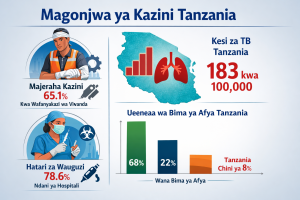
Ensuring Good Governance and Adherence to Judicial Decisions for Business Stability and AfCFTA Success in Africa
Traders in Tanzania recently staged protests against corruption within the Tanzania Revenue Authority (TRA), emphasizing the need for transparent trade regulations. This issue reflects the larger problem of corruption in Africa. To ensure the success of the African Continental Free Trade Area (AfCFTA) and attract international traders, African nations must prioritize good governance, combat corruption, and streamline bureaucratic processes. The traders’ grievances included issues with bureaucracy at the port, confiscation of goods by TRA, and burdensome registration requirements. They also highlighted inconsistent fees, overly strict measures, and low turnover thresholds for tax obligations. Considering the AfCFTA’s goal of promoting trade and economic integration by reducing tariffs, addressing these concerns becomes crucial in fostering a conducive environment for international business.
The strike in Tanzania was possible because the traders are citizens. However, it is important to consider the reaction of international businessmen when they encounter corrupt revenue officers, bureaucracy, and inconsistent fees at the port. This is particularly relevant in light of the African Continental Free Trade Area (AfCFTA), which aims to increase trade and economic integration in Africa by eliminating tariffs on 90% of goods traded.
To ensure the success of the AfCFTA and attract international traders, it is crucial for African countries to address corruption, streamline bureaucratic processes, and establish consistent and transparent trade regulations. By doing so, they can create a favourable environment for international traders, promote economic growth, and maximize the benefits of the trade agreement.
If international traders encounter a corrupt system, their reaction may be negative. Corruption and inefficiencies can discourage foreign investment and trade partnerships. International traders value transparency, fairness, and a conducive business environment. If they encounter corruption, bureaucracy, and inconsistent fees, it may undermine their confidence in doing business in that particular country or region.
Corruption is not a unique problem to Tanzania; it is a common phenomenon across the continent. Sub-Saharan Africa continues to face significant challenges in tackling corruption, as reflected by its average score of 32 out of 100 on the Corruption Perceptions Index (CPI). The majority of countries in the region still score below 50, indicating high levels of corruption. The security challenges, including military coups, extremism, and increased crime, are closely linked to corruption.
To address these challenges, states in Sub-Saharan Africa must prioritize good governance reforms, protect basic freedoms, and promote integrity in politics. Anti-corruption measures should be prioritized during emergencies, and public procurement systems should be made more transparent. Efforts to combat illicit financial flows and protect anti-corruption activists need to be accelerated.
“The longer protests or demonstration takes, the more the economy is affected.”
While not all member states of the AfCFTA guarantee good governance, it is the responsibility of the African Union (AU), established in 2002, to ensure adherence to good governance principles. The AU promotes unity, peace, and development in Africa, addressing governance, security, and economic integration. Consequently, the AU may issue statements to commend states practicing good governance or condemn malpractices, such as the recent unrest in Ethiopia and the enactment of laws that curtail individual freedoms and media.
The AU has a duty to ensure that judicial bodies, supported by an effective enforcement mechanism, function properly and that member states comply with rulings. The AU has the African Commission on Human and Peoples’ Rights (ACHPR), responsible for overseeing and interpreting the African Charter on Human and Peoples’ Rights, which advocates for the promotion, protection, and interpretation of human rights across Africa.
To put it into perspective, constitutional and legal cases were filed in Tanzania regarding provisions in the Media Services Act that violated press freedom and the East African Community Treaty in 2017. The East African Court of Justice (EACJ) ruled in favor of the applicants, directing Tanzania to bring the law into compliance. However, subsequent amendments proposed by the Tanzanian government have largely ignored the EACJ’s decisions. Thus, if ACHPR will lack a mechanism to enforce the decisions of the judicial body, strikes, and protests will continue and affect the business environment and the implementation of AfCFTA at large.
Knowing that bad governance causes people to strike, protest and plan for demonstrations, it is crucial to make sure good governance is observed to limit the likelihood of social unrest. Such activities, although constitutional can be avoided as they tend to go out of hand and make it difficult to control. For example, protests over food prices in Kenya took longer than the ones initiated by businesspeople in Tanzania. The longer protests or demonstration takes, the more the economy is affected.



